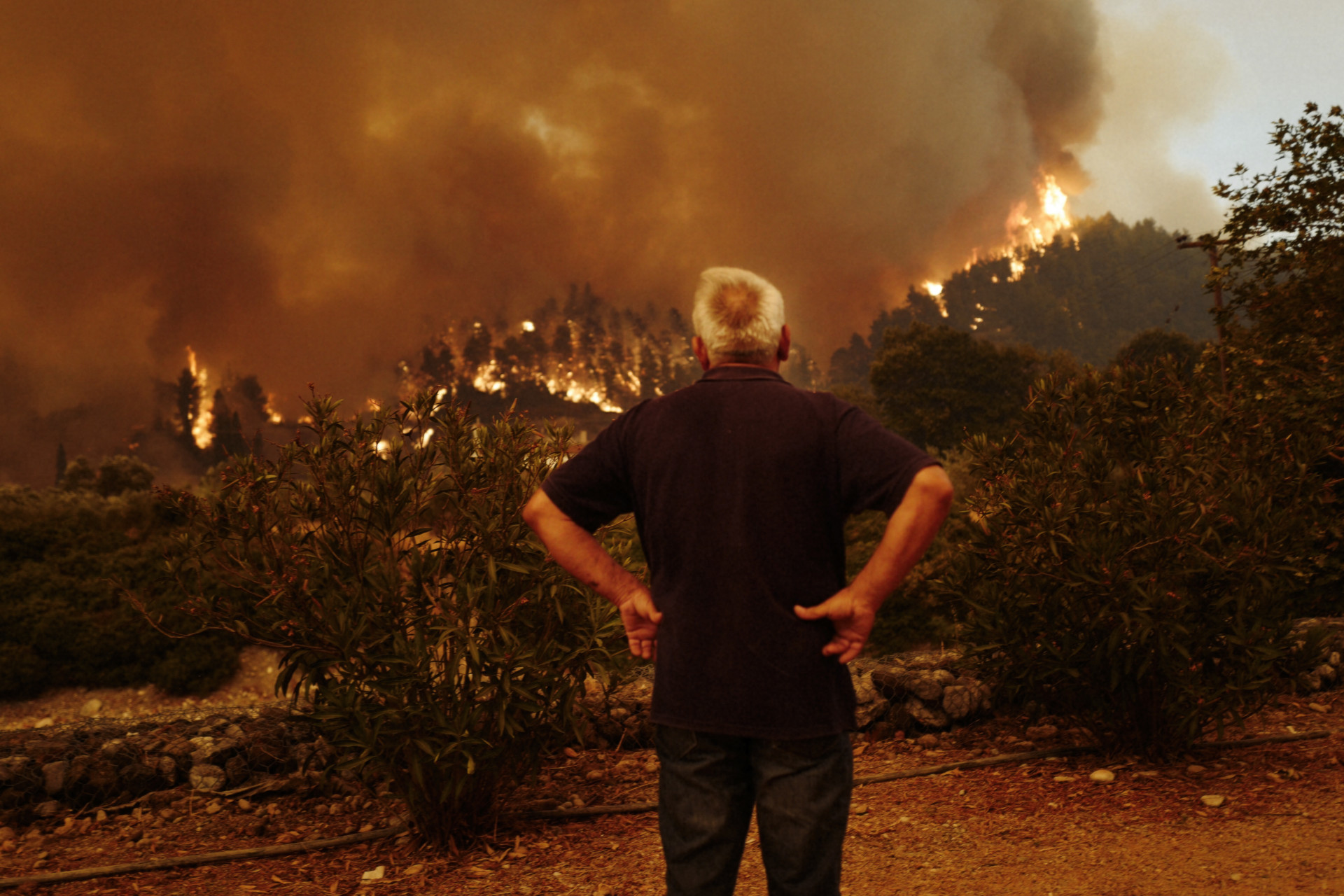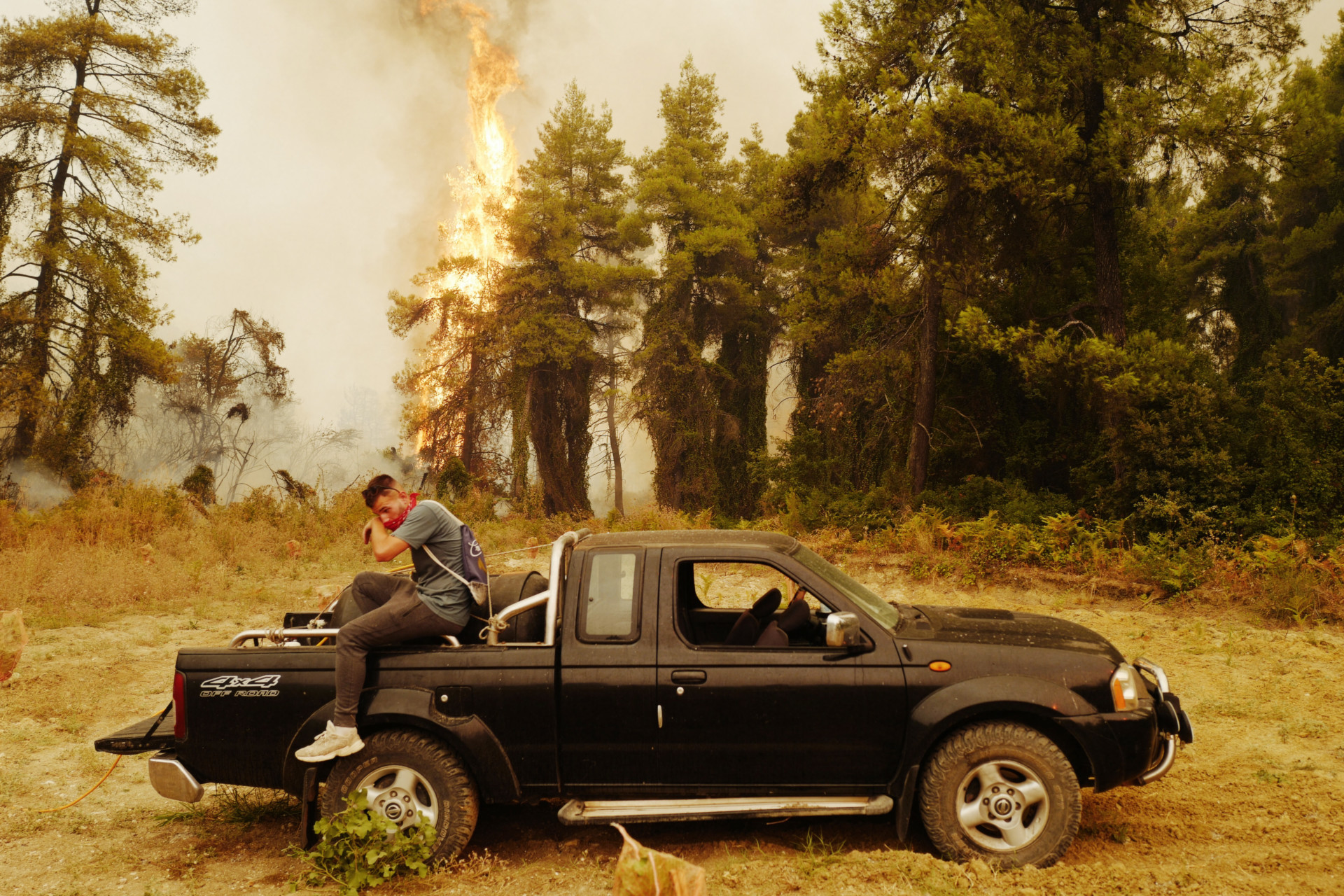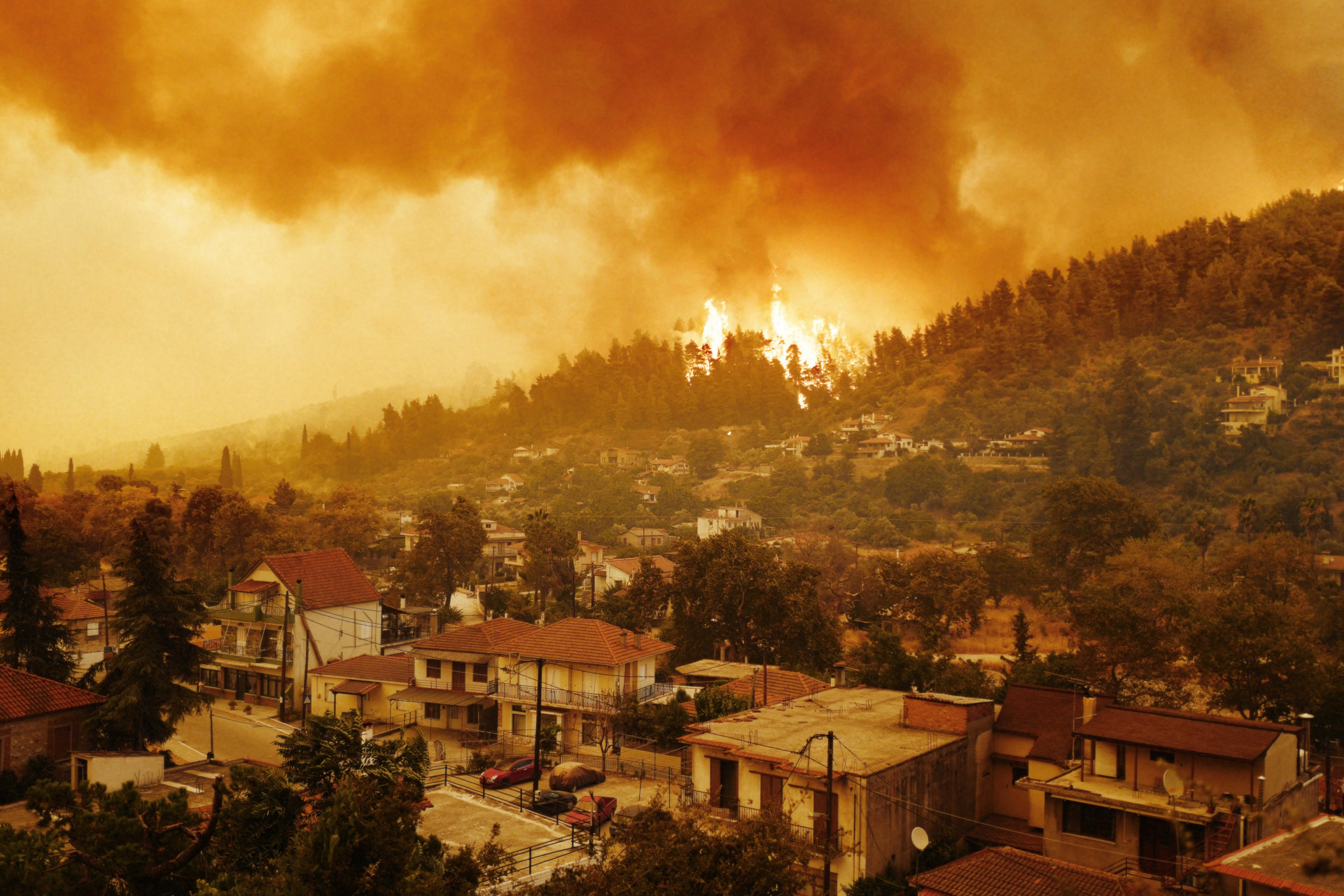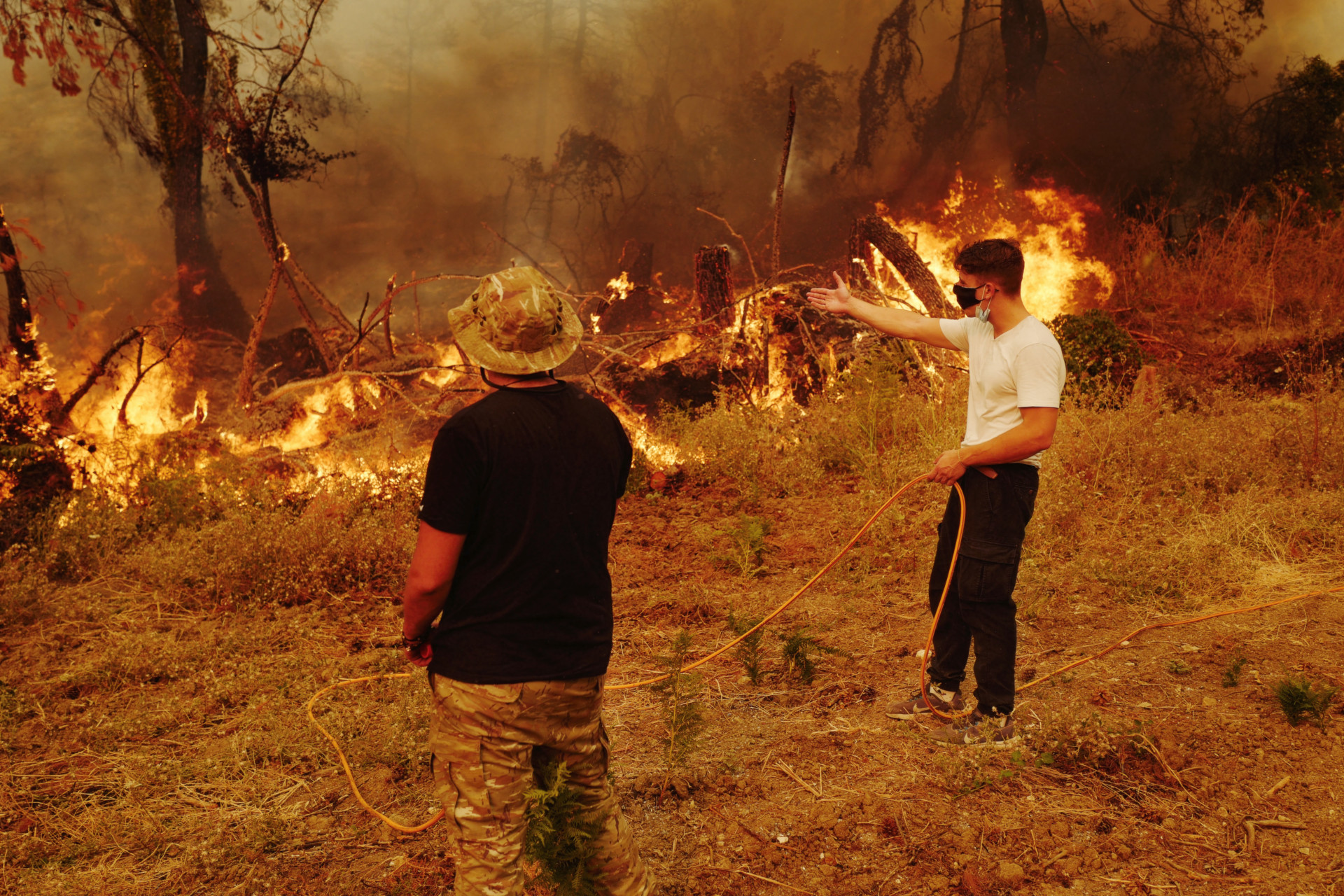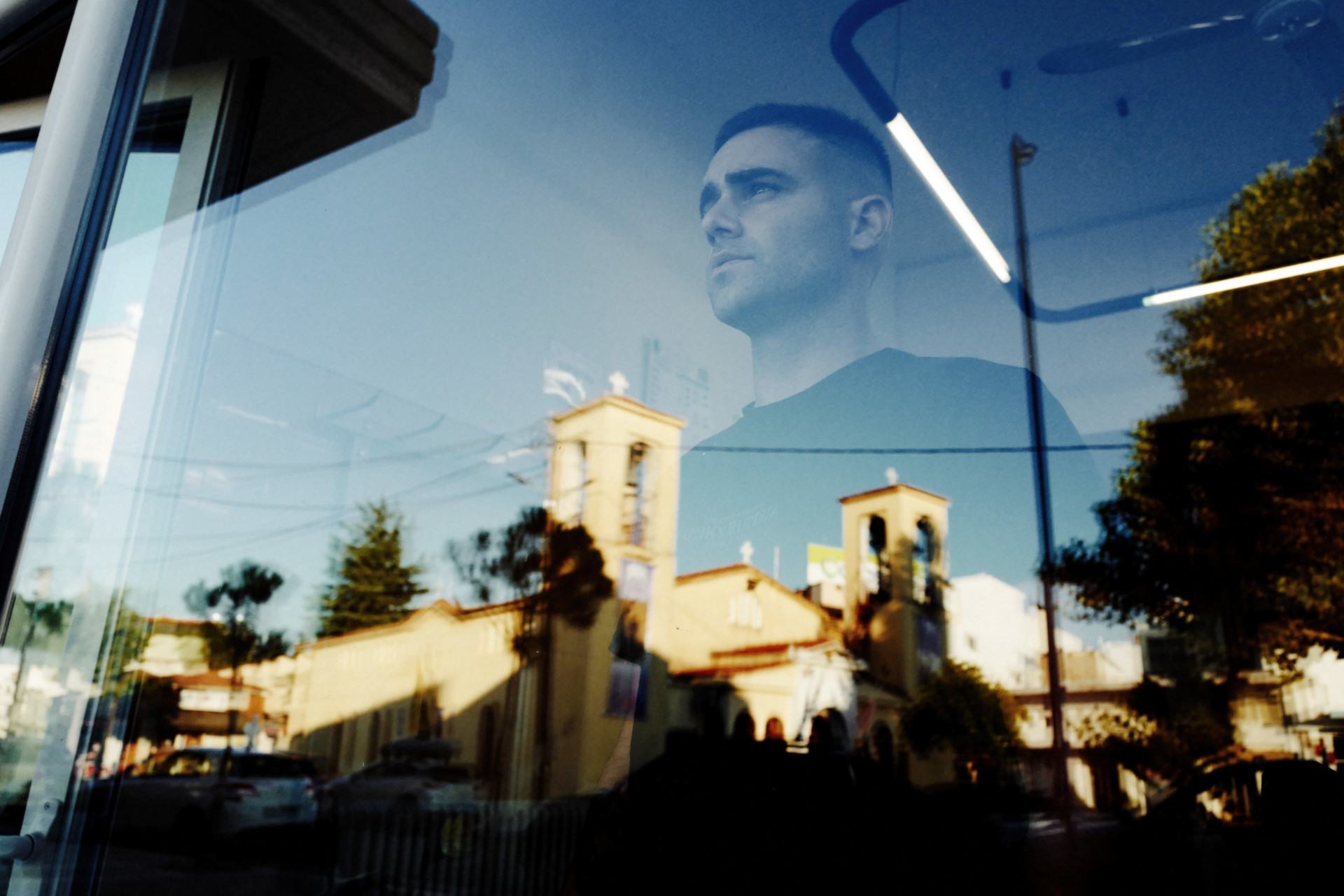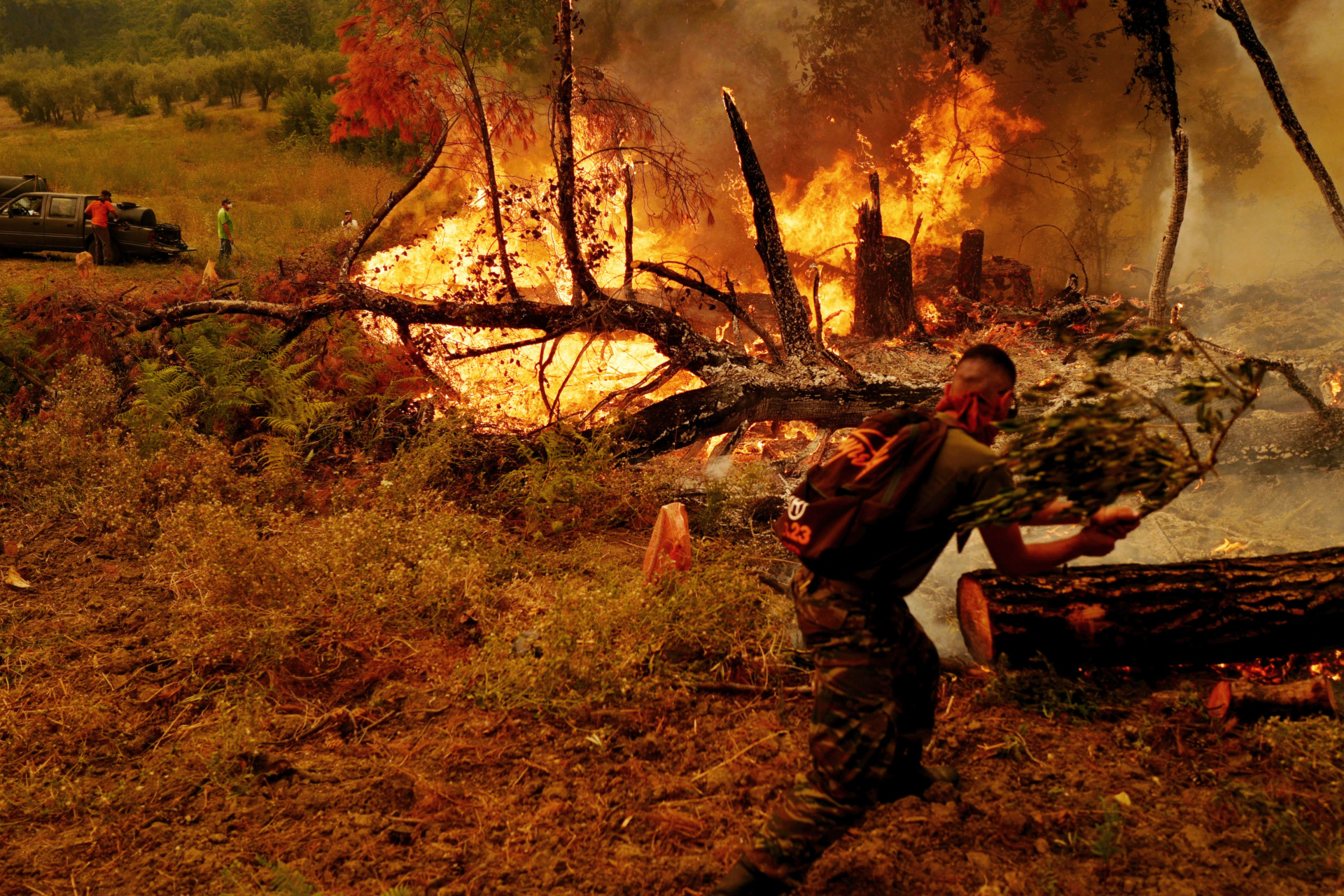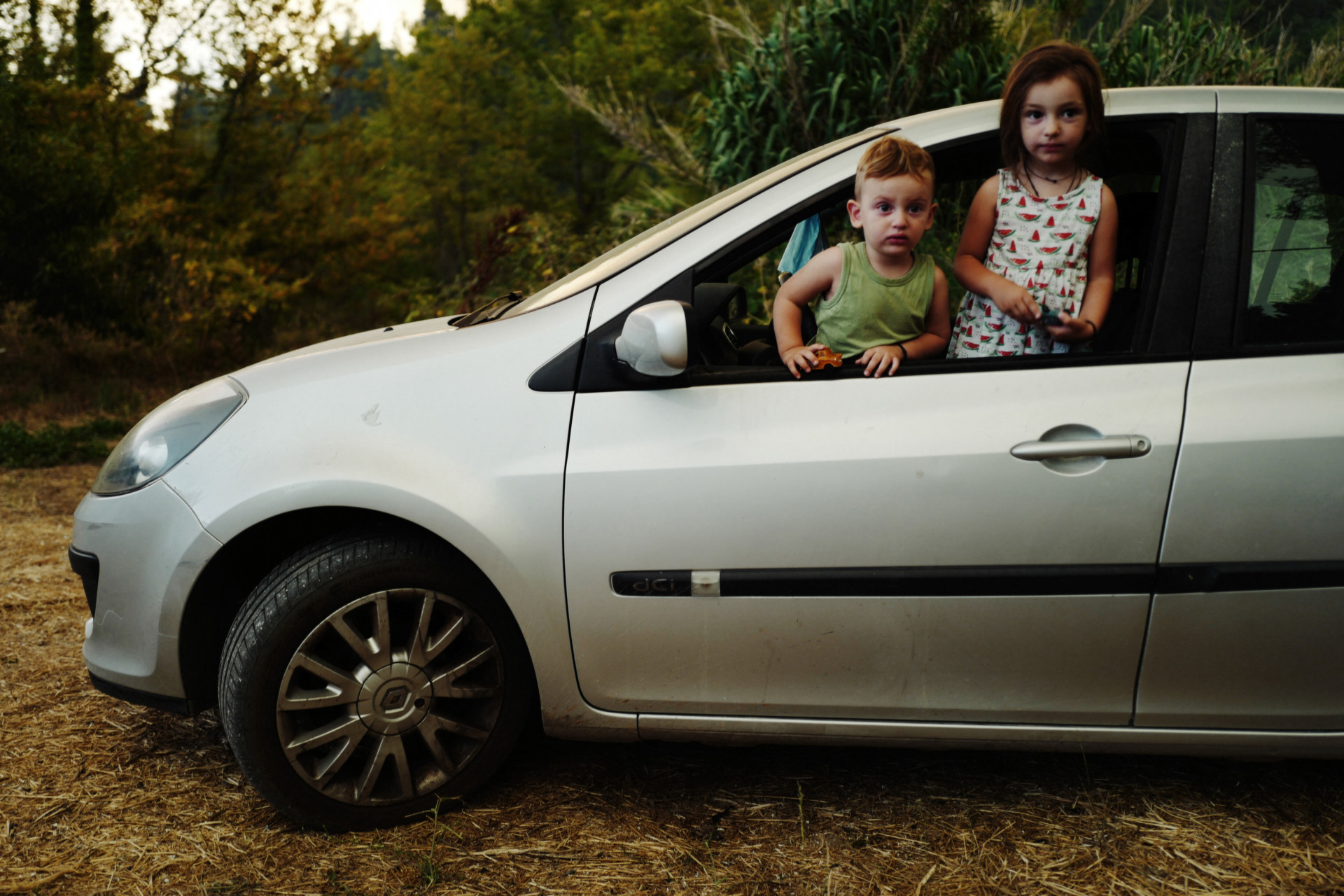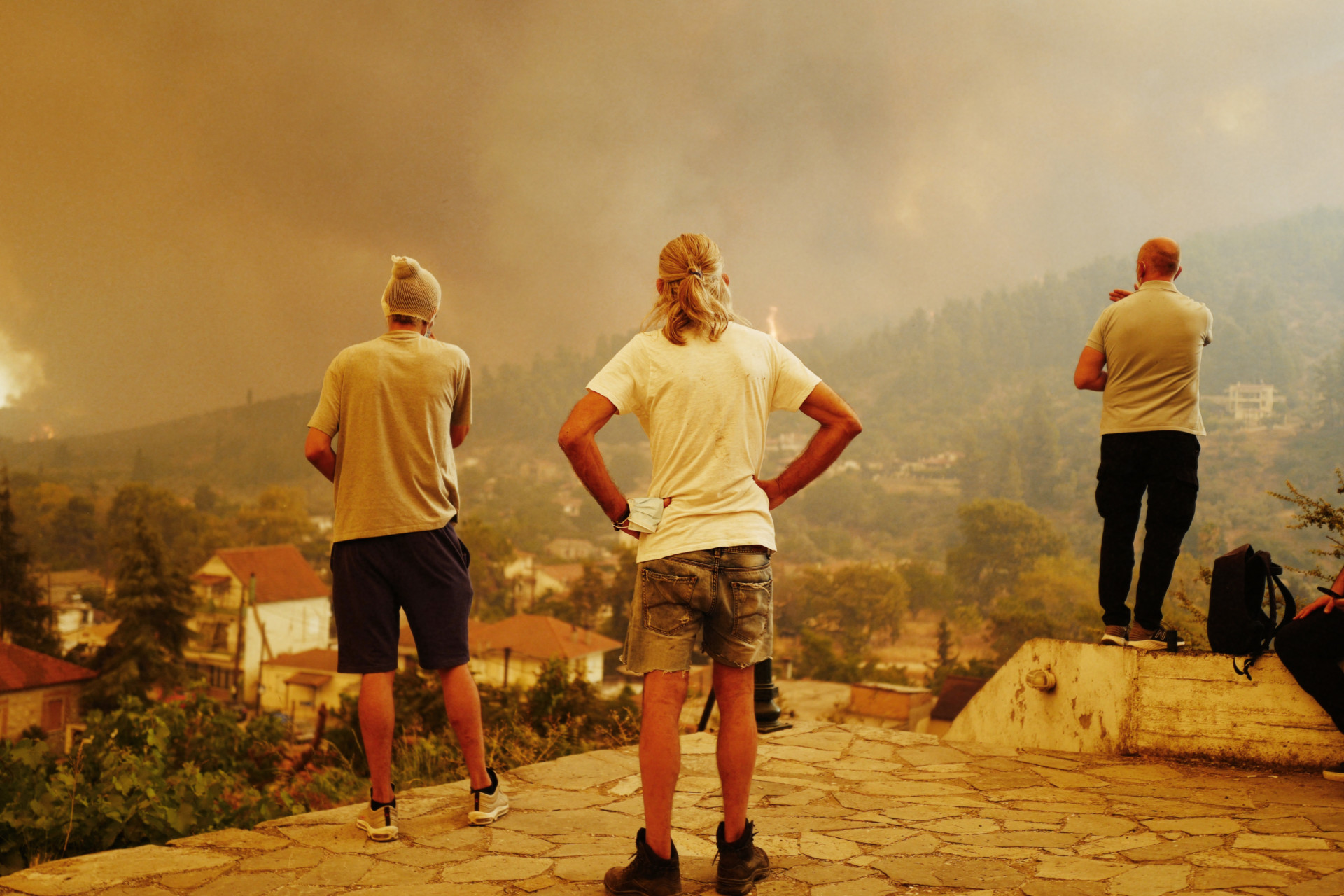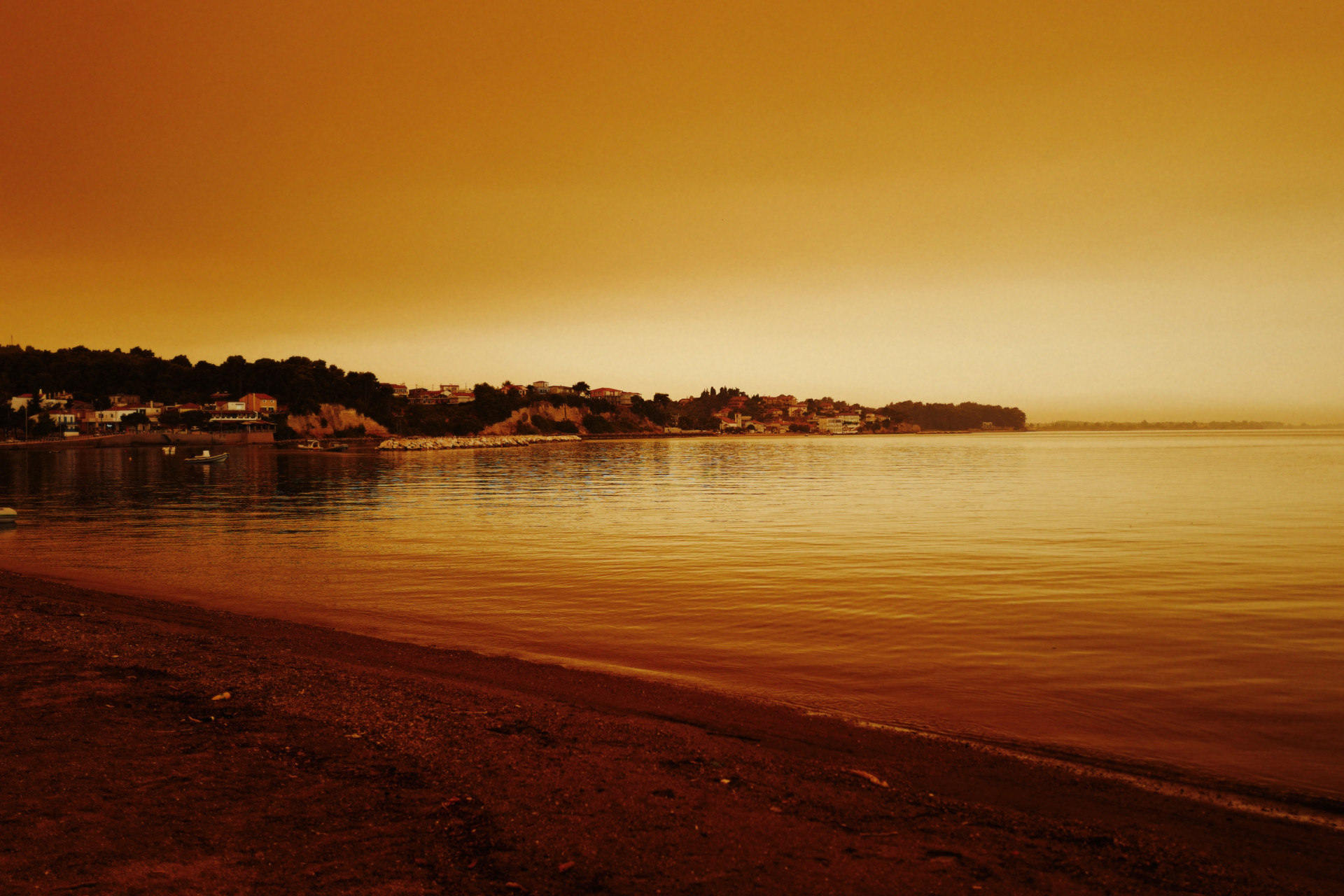After he received the call, Spyros Diamantis put down his coffee and left the cafe. “Let’s go, kids,” he shouted to his mates sitting outside, seven local lads dressed in T-shirts and the military fatigues they kept after completing national military service. Kamatriades, a village on the Greek island of Evia, is on fire. “They are afraid that it will move downwards,” Spyros said. They clambered onto the back of a battered green pickup truck, and Spyros started the engine. Hurtling down winding roads, through ashen smoke, we drove toward the inferno that has been blazing for a week on the island of Evia, a two-hour drive north of the Greek capital, Athens.
Wildfires are common in Greece. In 2018, high winds drove a fire through Mati, a seaside resort town northeast of Athens, killing 102 people, the highest recorded death toll in a Greek wildfire. I was there, and I remember the promises from authorities that lessons would be learned. Three years later, Greece burns once more. As the country sweats through its worst heatwave in 40 years, the forests that make up nearly a third of the country have become tinderboxes. Thanks to human-caused climate change, fires, like those seen here, will become a familiar sight to many across the globe.
This was not an average day for Spyros, a 26-year-old with a handsome face that could be on television. He normally works in his family’s supermarket in Istiaia, a hardscrabble town in northern Evia. Years of austerity, which has drained public resources and undermined governmental preparedness, combined with climate change has led to the worst wildfires since the 1980s, and everything has changed.
Spyros stopped stacking boxes in the supermarket warehouse and called a friend in town, a local firefighter, offering to help. At the fire station, they gave him a vehicle, hose and water pump. “I was forced to learn how to fight fires,” he told me. “I’m not a firefighter or anything like it. I just felt that my place needed me when the fires started, so I did it,” Spyros explained.
Up ahead, a police car blocked the road, a message blaring out from the loudspeaker on its roof: “MOVE IN THE OTHER DIRECTION. TAKE YOUR CARS. EVACUATE!” Spyros cursed, “Malaka,” and got out of the car to talk to the police officer. “In Greece, the number of police is so much higher than the number of firefighters. This is one of the reasons that in north Evia we are on fire for one week,” Takis Farados, Spyros’ friend and fellow volunteer firefighter, explained from the backseat. After some arguing with the police, Spyros was back behind the wheel and we were let through, bouncing down a dirt track toward the flames that were creeping closer to the tree line.
“If the fire is coming this way, we must go and get ahead of it,” Spyros said.
“Slowly, Spyros,” Takis tells him
“Is there a way to come back?” Spyros asked
“The same way we are going in, man.”
“Yeah, right, as if. If this all flares up, like we will have the time.”
The volunteers alongside Spyros are all friends. When Spyros began volunteering, it did not take long for the others to follow him. He had always been the leader of his tightknit crew, or pareia, in Greek. “Spyros doesn’t think a lot before he does something,” Thodoris Koubis, a childhood friend of his, told me. “He is philotimo,” he said, using a Greek word that is without definition and cannot be directly translated into English. The word comes from the Greek root “philo,” meaning friend, and “timi,” meaning honor. It encompasses pride in oneself, family, friends and a love of honor.
We stopped at a clearing before a burning forest of crackling trees and exploding pine cones. “Jump out, you lazy dogs,” Spyros shouted. The young men descended from the pickup and began to unravel the hose from the water pump, shouting commands at one another on how best to ready the hose to fight the flames.
Other vehicles joined the makeshift fire brigade and local residents began marching toward the flames armed with cut off tree branches, while Spyros’ crew carried the water hose. “Let’s get ahead of the fire so it doesn’t come this way, stop it moving towards the village,” one said. As we stepped toward the fire, our world turned hot, claustrophobic and suffocating. Flames climbed trees the size of buildings in a matter of minutes. A strong gust of summer wind could mean the end.. Ash dropped from the sky like summer snow. Spyros sprayed the base of the creeping bright orange flames with the water hose as the others frantically beat the fire with their tree branches.
Overhead, helicopter rotor blades whirred violently as an orange Sikorsky S-64 Skycrane disappeared into the thick smoke. It dropped its load: 2,600 gallons of seawater from its belly. So much water that, eventually, in fact, it passed the fire and started to drench us. I dropped to my knees and fell on the camera in my hands to protect it from the water. I borrowed it from a friend. If the fire doesn’t kill me, I was thinking, he certainly will if he finds out I destroyed it.
Forty-five minutes later, and they have done it. Spyros and his volunteer firefighter crew put out the fire and saved the village. “Only the people will save the people, my friend,” Spyros told me. “That’s the only way, on our own. “We return to Istiaia to Spyros’ local cafe, cold beers, on the house. “The guys are unbelievable, if they weren’t here to help, there would be nothing, everything would be burned. These guys. Our youth,” said Aggeliki Tsoutsika, the matriarch of the cafe.
A toast. “Mitsotakis, gamiesi!” (“Mitsotakis, go fuck yourself.”) It’s an insult hurled at Greece’s prime minister, Kyriakos Mitsotakis and a catchphrase that has become popular during the fires after a video in which a local Evia resident said it live on Greek TV went viral.
Holocaust is an Ancient Greek word meaning completely consumed by fire. And that’s what Evia was last month, completely consumed by fire. Fires around the northern parts of Evia, Greece’s second-largest island, have destroyed more than 150,000 acres of pine forest, razed homes, destroyed livelihoods and displaced hundreds of people. “This is unprecedented for us,” says Spyros, “at least for young people. Some older people might have seen it before.” It is something, scientists predict, Spyros will see again.
“Climate change is not the problem of the future; it’s here and now and affecting every region in the world,” said Friederike Otto from Oxford University, one of the many authors of the United Nations Intergovernmental Panel on Climate Change (IPCC) report published earlier this month. According to the report, if we fail to quickly mobilize a global response, the world faces climate catastrophe. Catastrophe may be a Greek word, but climate catastrophe is not solely a Greek phenomenon. This year, fires have burned in North America, Algeria, Turkey, Sweden, Finland and Italy. Germany suffered its worst floods in a thousand years; Belgium, Switzerland, the Netherlands, Britain and China saw floods too. The entire global ecosystem has changed. According to the IPCC report, southern Europe is more arid, northern Europe wetter. Floods and fires are the new normal. Many may feel that climate change catastrophe is beyond our ability to control, that it’s up to governments to resolve. But is there something that we as individuals can do to confront disaster?
That is a question that academic Daniel Aldrich has dedicated his life to. In 2005, Aldrich moved to Lakeview, New Orleans, with his family to begin an academic post teaching Japanese domestic policy at Tulane University, his first job out of graduate school. After buying new furniture and a car and enrolling his two young children in school, Aldrich went to bed early on an August Sunday, ready to start his new job the following day. “That day never happened,” Aldrich told me, “because we had to evacuate Sunday morning around 3 a.m. with what felt like a million other New Orleans residents, as Hurricane Katrina came in.”
Driving toward Houston with nothing but the clothes on his back and a bag of toys for the kids, Aldrich had found himself in the center of what the Federal Emergency Management Agency (FEMA) would call the single most catastrophic natural disaster in U.S. history. He was homeless, in shock and didn’t know what to do. “We thought that the government would somehow step in with a check like one of those Publishers Clearing House kind of moments,” Aldrich said. In the end, it was not the state, the market or institutions that came to his aid, but ordinary people, some of whom he had never met before. Schoolchildren in Detroit put on a fundraiser for his family, selling baked goods in the street. A lady in Georgia sold her lottery ticket and gave him the proceeds. Friends offered up their homes. “What really helped us, was not the government or whatever the private insurance that we had, or something like that. It’s really about the network. So, the people that we were connected to,” Aldrich said.
Since then, Aldrich has been fascinated with how survivors of major crises overcome disasters. He applied for grants and began researching disaster response efforts in India, Japan, Israel and Mexico. Aldrich is now a professor at Northeastern University and heads its security and resilience studies program. His ideas have had an effect on those engaged in disaster response worldwide, including Emma Le Mesurier, formerly chief impact officer of Mayday Rescue, the organization responsible for supporting Syria’s White Helmets (a humanitarian relief organization).
“We are all going to be victims of climate change, to a greater or lesser extent. But what is interesting is the possibility to transform ourselves from being the victims of climate change into being participants in solving the problem,” said La Mesurier, based on her experience in Syria.
What matters in times of crises, according to Aldrich and Le Mesurier, is who we know. Social capital is crucial to survive and thrive in the face of adversity.
Spyros and his friends are not alone in their efforts to help the community in the face of disaster. Evia has become a bustling hub of grassroots volunteer action, which strengthens social connections. Dipping a ladle into an industrial sized cauldron of orzo, a traditional Greek pasta dish, Kostas Polychronopoulos, founder of the charity “The Other Human,” has worked tirelessly to feed the hungry survivors of Evia’s fires. “Don’t put stuff in like that, put the oil in first, it will open,” Polychronopoulos shouted at Kostas Mizamitzis, a professional chef from Athens who, alongside Polychronopoulos, has established a “social kitchen” in Evia’s seaside town of Pefki. “Just trust me, trust me, it won’t burn,” Mizamitzis replied casually.
For his work feeding refugees on the island of Lesbos in 2015, Polychronopoulos was awarded the “European Citizen’s Prize.” He refused to accept it, however, in protest over the European Union’s treatment of refugees.
Polychronopoulos believes that the relationship between the state and the individual is different in Greece than in other countries and allows for more community action. “From the beginnings of the Greek state, the state did not help; nothing has changed,” Polychronopoulos said. Other grassroots volunteer efforts in Evia include rescuing animals lost among the wildfires, converting a gym in Istiaia into a makeshift shelter for those displaced by fire, and teachers, agricultural workers, doctors, dentists and shopkeepers working for free. “Solidarity is our only weapon,” Polychronopoulos said.
However, solidarity alone will not save people from natural disasters. “The people of Greece, after 11 years during which the troika has effectively denied them access to proper state protection, showed they have learned to help one another. Solidarity will, undoubtedly, be a major source of comfort for people who suffer the effects of climate change. However, this should offer no excuses to governments and international organizations, which continue fueling climate change and, at once, wrecking the civil protection services that are so desperately needed,” Yanis Varoufakis, a Greek economist and former finance minister, told me by phone.
Wildfires and extreme weather may have finally put climate change high on the global agenda, but it’s not something Spyros has given much consideration. “I don’t think climate change was at work here,” he said with such an uncharacteristic lack of confidence that I suspect that he does not fully understand the concept. Anyway, he’s got bigger questions on his mind now that he is Istiaia’s local hero. Has he had any luck with the ladies since he started fighting fires? “I haven’t gotten laid since I started volunteering, but my ex-girlfriend keeps calling me,” he said, shrugging. There are some flames, it seems, that Spyros can’t put out.
Additional reporting by Nikos Papanikolaou and Pavlos Kapantais



